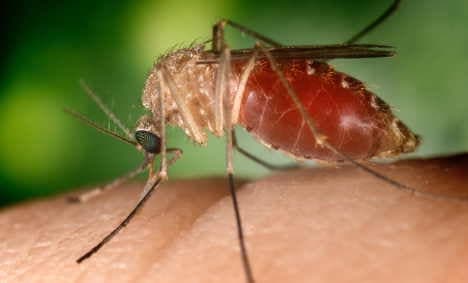Hot days draw harmful larvae to Germany

Researchers in Hamburg have discovered parasitic roundworm larvae in three species of mosquito in Brandenburg. It’s the first time the pest, which is common throughout parts of southern Europe, Africa and Asia, has been found in Germany.
Heartworms are parasites which are spread between hosts through the bites of mosquitoes. The German term for the pest, Hundehautwurm, literally “dog skin worm,” refers to its most common hosts, but cats, foxes and raccoons are among other known carriers. In rare cases, humans can also be infected.
It takes the larvae between ten and 30 days to undergo sexual maturation in their hosts and the process is dependent on consistently warm weather. Up until now, Germany was thought to have been spared the parasite because temperatures were not considered consistently high enough.
But the study by a Hamburg-based team of scientists found that three species of mosquito in the eastern state of Brandenburg were carrying heartworm larvae.
Climate change, as well as imports of infected dogs from southern Europe, could be behind the find, the Bernard-Nocht Institute for Tropical Medicine (BNI) said on Tuesday.
Researchers tested some 75,000 mosquitos from 55 areas in nine German states over a period of two years. In Brandenburg, three species of mosquito were repeatedly found to contain heartworm larvae.
“Since we discovered the parasites two years in a row, we suspect that in Brandenburg, at least, infection is occurring at a stable rate," Egbert Tannich, one of the scientists who carried out the study, said.
As heartworms mature inside their hosts, they take over and destroy tissue. Symptoms may not present for months until the worms are mature. They most often target lung tissue but in some cases, also take over the heart, which explains the English term for the pest.
This can lead to serious pulmonary and coronary conditions and death in host animals. In the rare case of a human being infected, the parasite can infect the brain, causing meningitis.
Researches have advised dog-owners to have their pets assessed by a vet so the spread of the pathogen may be contained. Some early signs of infection include itchy or infected skin, though often there are no indicators at all for months. If left untreated, dogs can carry the parasite for up to seven years.
DPA/The Local/kkf
Comments
See Also
Heartworms are parasites which are spread between hosts through the bites of mosquitoes. The German term for the pest, Hundehautwurm, literally “dog skin worm,” refers to its most common hosts, but cats, foxes and raccoons are among other known carriers. In rare cases, humans can also be infected.
It takes the larvae between ten and 30 days to undergo sexual maturation in their hosts and the process is dependent on consistently warm weather. Up until now, Germany was thought to have been spared the parasite because temperatures were not considered consistently high enough.
But the study by a Hamburg-based team of scientists found that three species of mosquito in the eastern state of Brandenburg were carrying heartworm larvae.
Climate change, as well as imports of infected dogs from southern Europe, could be behind the find, the Bernard-Nocht Institute for Tropical Medicine (BNI) said on Tuesday.
Researchers tested some 75,000 mosquitos from 55 areas in nine German states over a period of two years. In Brandenburg, three species of mosquito were repeatedly found to contain heartworm larvae.
“Since we discovered the parasites two years in a row, we suspect that in Brandenburg, at least, infection is occurring at a stable rate," Egbert Tannich, one of the scientists who carried out the study, said.
As heartworms mature inside their hosts, they take over and destroy tissue. Symptoms may not present for months until the worms are mature. They most often target lung tissue but in some cases, also take over the heart, which explains the English term for the pest.
This can lead to serious pulmonary and coronary conditions and death in host animals. In the rare case of a human being infected, the parasite can infect the brain, causing meningitis.
Researches have advised dog-owners to have their pets assessed by a vet so the spread of the pathogen may be contained. Some early signs of infection include itchy or infected skin, though often there are no indicators at all for months. If left untreated, dogs can carry the parasite for up to seven years.
DPA/The Local/kkf
Join the conversation in our comments section below. Share your own views and experience and if you have a question or suggestion for our journalists then email us at [email protected].
Please keep comments civil, constructive and on topic – and make sure to read our terms of use before getting involved.
Please log in here to leave a comment.